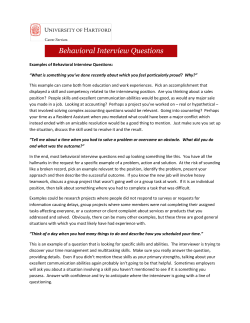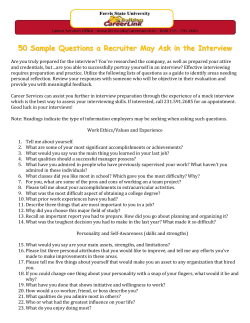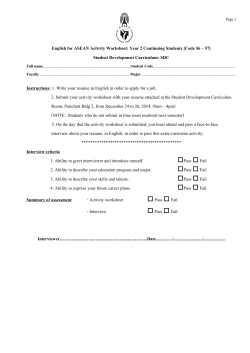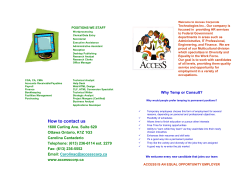
INTERVIEW TIPS Irrespective of the job you are going for there are
INTERVIEW TIPS Irrespective of the job you are going for there are certain things that hold universally true in terms of preparation for an interview. Whilst by no means exhaustive, we have endeavoured in broad strokes to cover some of the things you should be thinking about as you head into an interview scenario. There are no 100% right and wrong approaches however if you are at least conscious and preparing for some of these areas, the chances are you are giving yourself a better shot at success… 1. Do you know what the job is you are applying for and do you know what the organization does? Crazy, right? But over the years you would be amazed at the number of people who effectively have gone completely blind into an interview and been embarrassed by a simple question such as “so tell me what you know about us?” or “what’s your understanding of this role?” Even if you think you know the organization, do your research and make doubly sure. In an age of diversifying concerns perhaps the area of the company in question is actually significantly different to the big brand name’s primary business. Reread the job description if there is one and familiarize yourself with the key points it highlights. Perhaps make some annotations about any areas that you’d like to get more detail on within the interview (having some questions as we’ll cover later shows you have actually taken time out to think seriously about the position). If there isn’t a JD, interrogate your recruitment consultant (nicely now please!) for information that may help you gain a competitive advantage. A good recruiter will be there as an information resource for you and you should exploit the knowledge they have of their client and the role – often far more valuable than a piece of paper, which has either been put together hastily or is simply not up to date. 2. You can always dress down but never up – wear business attire as a default. Unless you are explicitly told otherwise, assume business dress for any interview situation. It will paint you in a professional light and show you have taken the opportunity seriously. Over dressing for an interview as opposed to underdressing is a far lesser evil; and you can always take that tie off if necessary whereas it’s very hard to find a suit jacket lying around when you need one... 3. Do you know your own CV? As important as the above; reread your CV and be prepared to answer questions on it!! For those of us who have been around for a little while now, do we actually know the contents of our resumes or just the last couple of years’ worth of information? As you go through the CV try to remember what you did in each role – key responsibilities, projects, and achievements. If you’ve at least thought about these before the interview, there is a good chance you will have good answers on hand to get you out of potentially sticky interview questions. I always tell my guys to pick at least three successful projects that they can refer back to and know them inside out in detail – it’s amazing how many situational based questions (see later) three “go-to” projects or roles can help you answer when faced with an interview brain freeze! 4. Why are you the right person for this job? Above all try to think as a hiring manager would… why is this person looking to hire someone new, what is it about your experience that will appeal to them, and how do you best articulate this? Bring what you have learnt from points 1 and 2 (above) and try to marry them together in terms of supply and demand. What is the need, which the role represents in this person’s team and what is it about you that fulfils that need (qualifications, skills, personality, experience, etc)? If you can articulate this in an interview and the interviewer likes you, there is a very good chance you will get the work. 5. Types of questions you might face; direct/indirect questions and what’s all the fuss about competency based interviewing… Broadly speaking there are two types of question you might face in an interview; namely direct and indirect questions; where indirect questions are often referred to within the industry as “competency” or “situational” based interviewing. A direct question might be something as simple as “are you a good team player” or “what do you believe are the core competencies needed to work successfully in a team”. In theory these are fairly easy questions to answer in a manner that satisfies what the interviewer effectively wants to hear – “yes, I am a good team player” and “I think we all need to be able to listen to each other and cooperate”. Competency or situational based interviewing is designed to get around people giving these comfortable (and sometimes untruthful!) answers by asking for real life examples of where a candidate can demonstrate these skills in the work place. Typically the questions will start with “tell me about a time when…” and go into some depth in soliciting how you have worked/behaved under a particular circumstance. Think about it as the difference between stating and demonstrating your ability. Skilled interviewers will often start with direct questions and then back them up with some situational concepts to reinforce their original impressions. So if your answer to a direct question such as “what skills do you believe a good consultant needs to show in a pressured project situation?” is “tact, resourcefulness, and time management”, hopefully you will have thought about a way of backing those concepts up with real life examples when your interviewer says “tell me about the hardest project you ever worked on and the stakeholders it involved interacting with” or “tell me about a time there was some conflict on a project and how you went about resolving it”… If you don’t have too much recent experience interviewing, it is worthwhile considering how you would approach a variety of direct and indirect questions. For sample questions please see the following link. 6. Dealing with the salary question… how to approach it and still come off OK. This is perhaps one of the most dreaded parts of an interview for both interviewer and candidate alike. Under normal circumstances we would prefer these negotiations to go through your Acuity Search consultant who should be well placed to guide both parties through the negotiation in a smooth and amicable fashion. However there are times when we understand this may come up in conversation for permanent roles in particular and it is important you be prepared to answer them effectively. The best approach I find in these situations is one of transparency – tell your interviewer what you are either earning at the moment and/or what you are looking for in your next role but also make it clear, almost in the same breath, that you are really more interested in landing the right role than the salary itself per say. By doing this you will have at once set a bench mark in terms of where your expectations are at (which should of course coincide with the conversations you have already had with your recruitment consultant) while making it clear that your motivations are not purely of a monetary nature. 7. Relax a little – we all want to employ nice people…! Last but not least – try to put yourself in your interviewer’s position. Obviously they need to hire someone who is suitably qualified for the role, however finding someone to join your team is also about personality fit and everyone likes to work with people they can get on with. It is important to strike that balance between coming across as a model professional but also as someone that will be a positive influence around the office and generally nice to be around. We are certainly not suggesting coming into your future boss’ office and making yourself at home with your feet up on the table but certainly too much austerity can also not do you justice as a person.
© Copyright 2025











